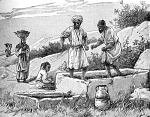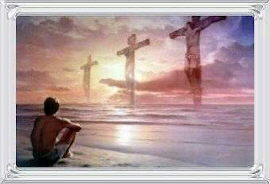
Tuesday, May 27, 2008
Tonight this chapter begin with The Parable of the Wedding Feast. This is significant because this was one of the greatest parables Jesus gave for the period in which we live. Take note of the first line:
And Jesus answered and spake unto them again by parables, and said [Matt. 22:1].
Take note of the word again. This little word indicates that Jesus is still addressing the chief priests and elders mentioned in Matthew 21:23.
Obviously, “a certain king” is God the Father, and “his son” is the Lord Jesus. He resorts to the expression “kingdom of heaven” instead of kingdom of God which He used in the previous two parables. 
He “sent forth his servants to call them that were bidden to the wedding.” Who were bidden? The lost sheep of the house of Israel. Our Lord sent His apostles to them. And the prophets had been the messengers back in the Old Testament. Israel's response was rejection of God’s invitation. They killed His messengers, including the Jesus Himself.
In verse 8 we will see a definite change in the method and manner of the invitation, and it refers to the present age in which we live. Notice what happens. The King's invitation is for everyone, but there is a danger of coming without meeting the King's demands. The wedding garment is the righteousness of Christ, which is essential for salvation, and it is supplied to all who believe!
Notice verse 12, he was speechless! I hear some folk say that they don’t need to receive Christ, that they will take their chances before God, that they intend to argue their case. Well, our Lord said that this fellow without the wedding garment was speechless.
Whether or not you accept the wedding garment is up to you. Christ has provided it for you. The invitation has gone to everyone, but you will have to come on the King’s terms.
In the next three sections we have the Herodians coming with the question of paying tribute to Caesar. The Sadducees coming with a question regarding the resurrection. And the Pharisees coming with their question concerning the great commandment of the Law.
First Jesus answers the Herodians. They were a political party favoring the house of Herod, who wanted deliverance from the Roman yoke. Herodians weren't a religious party but were strongly political. However, the Pharisees apparently used them, and it is quite possible that many Pharisees were Herodians as well.
It was a trick question. If He said no to paying taxes to Caesar, He would be accused of being a traitor. If He said, yes to paying tribute, then He could not be the true Messiah. Notice Jesus calls them what they are...hypocrites.
It's notable that He used their coin. They were using the legal tender of the Roman government, walking on Roman roads, where Rome provided them with a measure of peace, so they owed Rome. Therefore render unto Caesar, what is Caesar's! But there is another side to this coin...render unto God what is God's!
Now Jesus gets to answer the Sadducees. This is a really funny story because it reminds me of a modern soap opera like As The Stomach Turns...LOL! The Sadducees use a ridiculous illustration to try and trap the Lord, because they didn't believe in the resurrection. Just think of a woman who had seven brothers for her husbands. She must have lived in Hollywood! Their question: In the resurrection, whose wife would she be?
Notice what Jesus says, we will be like angels in that we will not marry in heaven. There will be no necessity to continue the race by procreating. This doesn't mean that a husband and wife who were close here can't be together there. If they want to, they can. Think of the ones who wouldn’t want to be together. They won’t have to be! They both will have new dispositions, and probably they'll get along better there than they did here! LOLOkay Herodians and Sadducees down, now come the Pharisees! The Pharisees have a huddle and send forth a very clever lawyer, that is, a scribe who is expert in Mosaic Law to ask which is the greatest commandment in the law?
Notice Jesus doesn't pick one of the Ten Commandments. He says: "Love the Lord thy God with all thy heart, and with all thy soul, and with all thy mind." Then gives them a second. "Thou shall love thy neighbor as thyself." These two commandments actually summarized the entire Mosaic Law. And show us how we fall short.
The Pharisees go back to the huddle and try to trap Him again, but He beats them to the punch and asks them a question. The Lord Jesus is quoting Psalm 110:1. How could David call his son his Lord? The Pharisees would have to say that the son would have to be supernaturally born for David to call him “my Lord.” The Lord Jesus was forcing the Pharisees to face up to the real issue and to acknowledge Him as David’s son and as David’s Lord. This ended the verbal clash with the religious rulers.
Monday, May 12, 2008
 Chapter Twenty contains a lot of meat, as my Pastor would say. The first sixteen verses deal with the Parable of the Workers in the Vineyard.
Chapter Twenty contains a lot of meat, as my Pastor would say. The first sixteen verses deal with the Parable of the Workers in the Vineyard.
This parable is closely related to the previous chapter. So you see that at both the beginning and at the end of this parable the concept of the last being first and the first, last, forms sort of a parenthesis around it.
You see the landowner going out four times to gather workers. This is a tremendous parable (vv1-16) which illustrates an important truth: It is not the amount of time which you serve nor the prominence or importance of your position which determines your reward. Rather, you will be rewarded for your faithfulness to the task which God has given you to perform, regardless of how small or how short or how insignificant it appears.
Perhaps God has not called you to do something great for Him, but are you faithful in what He has assigned to you? The next section (vv17-19) we have is Jesus' fourth announcement of His death and resurrection. This is the fourth time He is telling them, in detail, exactly what is going to happen to Him. Somehow the disciples didn’t comprehend it, cause it just didn’t fit into their program. However, as you and I read it now, we see very clearly that it was Christ’s intention to go to Jerusalem to die. Let’s ponder the significance of this. He went there deliberately to die for you and for me. That is something to think about. The disciples of Jesus just couldn’t believe it!
The next section (vv17-19) we have is Jesus' fourth announcement of His death and resurrection. This is the fourth time He is telling them, in detail, exactly what is going to happen to Him. Somehow the disciples didn’t comprehend it, cause it just didn’t fit into their program. However, as you and I read it now, we see very clearly that it was Christ’s intention to go to Jerusalem to die. Let’s ponder the significance of this. He went there deliberately to die for you and for me. That is something to think about. The disciples of Jesus just couldn’t believe it!
The next section (vv20-28) deals with the request of the mother of James and John. At the time of Jesus’ significant announcement of His pending death, the mother of James and John came to Jesus to ask Him a favor. There are a great many of us who worship Him with the same motive! She wants for her sons to sit on Jesus' right and left hand, in the kingdom. On any other occasion this request would be a natural one for a mother who was ambitious for her children. In this instance, however, she missed the atmosphere and the very understanding of what was really taking place.
She wants for her sons to sit on Jesus' right and left hand, in the kingdom. On any other occasion this request would be a natural one for a mother who was ambitious for her children. In this instance, however, she missed the atmosphere and the very understanding of what was really taking place.
Don’t miss the meaning here because it is so important to Christians today. Our Lord is not saying that there is no place at His right hand and left hand for somebody. He is saying that He will not arbitrarily give the positions to James and John or to anyone else. Rather, the places are for those who prepare themselves for them.
Heaven is for the asking. You do nothing for salvation. You are saved by faith in Christ through His marvelous grace. However, your position, your reward in heaven is determined by what you do down here on earth. That is very important, and Christians seem to have lost sight of it. What kind of a place are you preparing for yourself?
Personally, I have no ambition for the places on Christ’s right or left hand. I’m sure I have missed those, but I am working for a place. All of us should be doing this. In Philippians 3:14 Paul said, “I press toward the mark for the prize of the high calling of God in Christ Jesus.” The trouble with Christians today is that too few are even trying to win anything. We need to recognize salvation as a free gift, but we need to get on the race course in order to receive a reward.
And the last section (vv29-34) is the two blind men who get their sight back. Jesus and His disciples are going from Jericho to Jerusalem, which is the opposite direction from the man who went down from Jerusalem to Jericho and fell among thieves. The Lord is going from Jericho up to Jerusalem to die with thieves.
By the way, some folk think that because at His trial He did not defend Himself, He never defended Himself, and that Christians should follow the same policy. However, at other times He did defend Himself. When He went to Jerusalem to die, He did not defend Himself because He was taking our place, and we're guilty. Believe me, there was no defense! That is the reason He did not open His mouth at that time. He was bearing our sin at that time. They acknowledged His kingship. Even though the Lord could see their problem, why did the He ask what He could do for them? When you come to the Lord Jesus Christ, you must tell Him your need. If you are coming to Him for salvation, you must tell Him that you are a sinner and need His salvation. If you don’t, you will not be saved. That’s the offense of the cross.
They acknowledged His kingship. Even though the Lord could see their problem, why did the He ask what He could do for them? When you come to the Lord Jesus Christ, you must tell Him your need. If you are coming to Him for salvation, you must tell Him that you are a sinner and need His salvation. If you don’t, you will not be saved. That’s the offense of the cross.
Everybody would like to come to the cross if they could bring along the perfume of their self-righteousness and good deeds. But, you and I haven’t any goodness at all, none whatsoever, to present to God. You can no more sweeten human character with training and psychology and education than you can sweeten a pile of fertilizer out in the barnyard with Chanel No. 5. We have to come to Him as sinners and receive Him as our Savior. And the blind men came to the Lord Jesus with their need, “Lord, that our eyes may be opened”!
Our Lord healed them, and they followed Him. Remember where He is going. He is on His way to the cross.

























